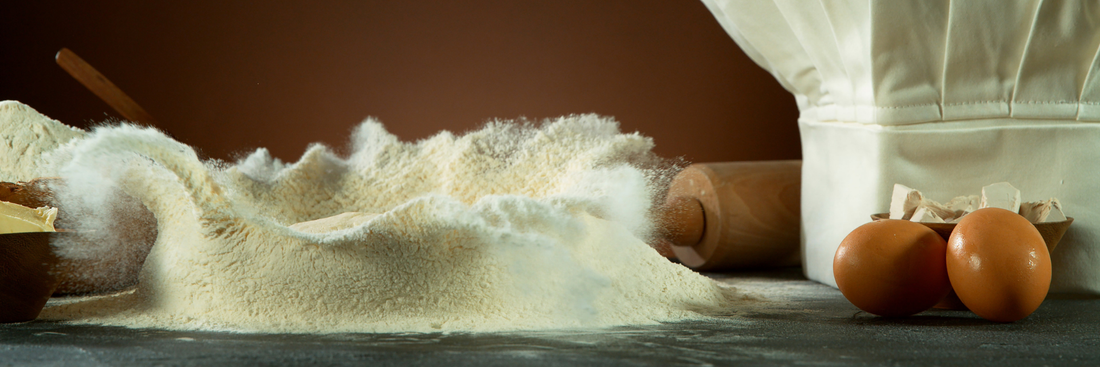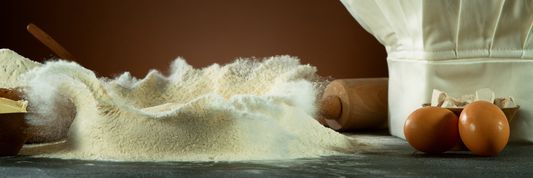If you’ve ever bought flour in bulk or found yourself with extra after baking season, you may wonder: can you freeze flour?
The short answer is yes, freezing flour is one of the best ways to extend its shelf life, prevent rancidity, and protect it from pests and pantry moths.
In this complete guide, you’ll learn how to freeze flour properly, which types of flour freeze best, how long you can freeze them, and whether freezing affects baking performance.
-
Flour Calories: How Many Calories Are in Flour (Per 100g, Cup, and Tablespoon)?
-
Chickpea Flour (Besan): Benefits, Nutrition Facts, and How to Use It in Cooking
-
Is Flour Healthy? A Complete Guide to Flour Nutrition, Benefits, and Health Risks
Why Should You Freeze Flour?

To Prevent Rancidity
Whole grain and nut-based flours such as whole wheat flour, almond flour, and coconut flour contain natural oils. These oils can turn rancid when exposed to warm temperatures. Freezing flour stops this process by slowing oxidation and extending freshness.
To Kill Bugs and Eggs
You can also freeze flour to kill bugs or insect eggs that might be hidden in the package. Keeping flour in the freezer for 48–72 hours ensures it’s completely pest-free a common trick professional bakers use.
To Extend Shelf Life
When stored at room temperature, white flour lasts around 6–8 months, while whole wheat flour may spoil within 3 months. Freezing can extend flour shelf life up to 2 years when sealed properly.
Can You Freeze All Types of Flour?

Yes, but different flours have different needs. Here’s what you need to know about each:
Can You Freeze All-Purpose Flour?
Absolutely. Freezing all-purpose flour keeps it fresh for up to 2 years. It’s the easiest flour to freeze since it has little oil content.
Can You Freeze Bread Flour?
Yes. Bread flour and high-gluten flour can be stored in the freezer with no effect on baking performance. Just bring to room temperature before using in yeast recipes.
Can You Freeze Whole Wheat Flour?
Definitely. Whole wheat flour should be frozen because its germ and bran contain oils that go rancid quickly. Freezing preserves flavor and nutrition.
Can You Freeze Almond Flour and Coconut Flour?
Yes, it’s strongly recommended. Nut flours have high-fat content, making them more likely to spoil at room temperature. Store in airtight bags or jars for up to 12 months.
Can You Freeze Gluten-Free Flour Blends?
Yes. Gluten-free flour blends (rice, tapioca, oat, or sorghum-based) freeze well. Just ensure they are sealed tightly to prevent moisture.
Can You Freeze Self-Rising Flour?
You can, but keep in mind that baking powder and salt can lose potency over time. For best results, store self-rising flour in a cool pantry instead of long-term freezing.
How to Freeze Flour Properly
Freezing flour is simple, but proper packaging makes a big difference. Follow these steps for best results:
Step 1: Portion the Flour
Divide the flour into recipe-sized portions (for example, 2–4 cups per bag). This makes it easier to use without repeated thawing.
Step 2: Package Airtight
Don’t freeze flour in its paper bag. Instead, transfer it into freezer-safe airtight bags, vacuum-sealed bags, or food-grade containers. Squeeze out all excess air.
Step 3: Label and Date
Write the flour type, freezing date, and weight on each bag to keep track.
Step 4: Freeze It
Lay the bags flat in the freezer. Once frozen solid, you can stand them upright to save space.
How Long Can You Freeze Flour?
The longevity of frozen flour depends on its type:
| Flour Type | Pantry Shelf Life | Freezer Shelf Life | Notes |
|---|---|---|---|
| All-purpose flour | 6–8 months | 1–2 years | Store airtight |
| Bread flour | 6–8 months | 1–2 years | No baking effect |
| Whole wheat flour | 3 months | 1 year | Prevents rancidity |
| Almond or coconut flour | 3 months | 12–18 months | Keep airtight |
| Gluten-free flour | 6 months | 12 months | Prevent moisture |
For long-term flour storage, freezing is the most reliable method, especially if you live in a humid or warm climate.
How to Thaw and Use Frozen Flour
One common question is whether you need to thaw frozen flour before baking. The answer: not always.
- For cookies, cakes, or muffins you can use flour straight from the freezer.
- For yeast breads it’s best to bring flour to room temperature before mixing, as cold flour can slow yeast activity.
- To thaw quickly: spread the flour on a baking tray at room temperature for 30 minutes.
Always weigh flour instead of scooping when measuring frozen or cold flour to ensure accuracy.
Can You Freeze Flour to Kill Bugs?
Yes, absolutely. Freezing flour is a reliable way to kill pantry moth eggs and weevils. Place your flour in the freezer for 3–4 days before transferring it to pantry storage. This technique is often used when buying flour in bulk or from bulk bins. Always use airtight containers afterward to prevent reinfestation.
Does Freezing Flour Affect Baking Quality?
Good news: freezing flour does not ruin it. It won’t change the flavor, texture, or baking performance. However:
- Cold flour may make doughs slightly denser at first; simply adjust by using lukewarm water in yeast recipes.
- Avoid exposing flour to moisture during thawing to prevent clumping.
Alternatives to Freezing Flour
If you don’t want to freeze, here are other safe flour storage options:
- Refrigeration: Great for whole-grain flours; lasts 6 months.
- Vacuum sealing and Mylar bags: Ideal for bulk storage in pantries.
- Buy in smaller quantities: Fresh-milled flour tastes best within weeks.
Troubleshooting: Common Issues with Frozen Flour
| Problem | Cause | Solution |
|---|---|---|
| Flour clumps | Moisture exposure | Sift before use |
| Flour smells stale | Rancidity | Discard |
| Freezer odor | Poor packaging | Use double freezer bags |
| Baking feels heavy | Cold flour | Warm to room temperature |
Quick Summary
- Yes, you can freeze flour safely.
- Best for whole wheat, nut, and gluten-free flours.
- Freezer life: up to 2 years for refined flour, 12 months for whole grain.
- Always store airtight, label, and portion.
- Thaw before yeast baking, or use directly for cakes and cookies.
FAQs (People Also Ask)
Can You Freeze Flour to Kill Bugs?
Yes, freezing flour for 48–72 hours kills eggs and larvae effectively.
How Long Can You Freeze Flour?
White flours last up to 2 years, while whole grain and nut flours last 6–12 months in the freezer.
Does Freezing Flour Affect Baking?
No — freezing flour doesn’t alter baking quality or texture.
Do You Need to Thaw Flour After Freezing?
You can use frozen flour directly for most recipes, but thaw it for yeast breads.
Can You Freeze Self-Rising Flour?
Yes, but baking powder may lose strength over long periods; use within 6 months.
Conclusion
Freezing flour is an easy, effective way to reduce food waste, save money, and keep your baking ingredients fresh year-round. Whether you bake weekly or occasionally, keeping flour in the freezer ensures you’ll always have a pest-free, fresh supply ready to use.







